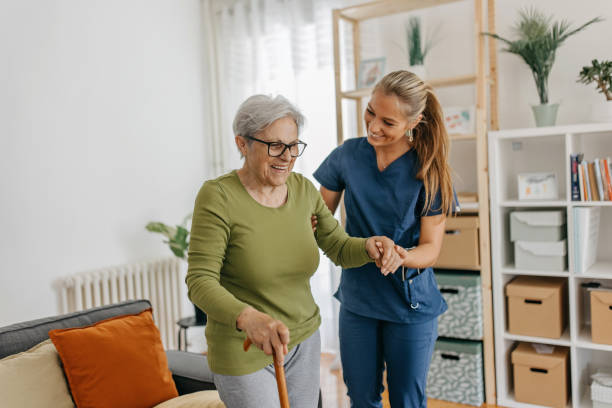Home health care services play an essential role in improving the quality of life for individuals who need assistance but prefer staying in the comfort of their own homes. From managing chronic illnesses to recovering from surgeries or injuries, these services ensure patients receive personalized care while maintaining their independence. The type of professionals providing home health care varies based on the individual’s needs, and understanding the roles these caregivers play can help families choose the right care for their loved ones.
This blog will explore the top three professionals most likely to provide home health care and their specific tasks.
Contents
1. Registered Nurses (RNs) and Licensed Practical Nurses (LPNs)
One of the most essential professionals in home health care is nurses, who specialize in providing medical care and health management services at home. Registered Nurses (RNs) and Licensed Practical Nurses (LPNs) are often dispatched to manage patients with chronic diseases, administer medications, or assist with post-surgery care.
Roles and Responsibilities
- Monitoring vital signs and assessing the patient’s condition.
- Administering injections, IV therapy, and other treatments.
- Managing wound care and dressing changes for patients recovering from surgery or injury.
- Educating patients and their families about managing chronic conditions like diabetes or hypertension.
- Coordinating with physicians to adjust treatment plans based on the patient’s progress.
RNs typically take on a supervisory role, evaluating the patient’s condition and ensuring proper medical procedures are followed. LPNs, on the other hand, focus on direct care tasks such as administering medications or changing bandages under the supervision of RNs or doctors.
Why They Matter: Having professional nursing care at home can reduce hospital readmissions, promote faster recovery, and improve the quality of life for patients with complex medical needs.
2. Physical, Occupational, and Speech Therapists
Therapists are another crucial group of professionals offering home health care services, especially for patients who require rehabilitation to regain their independence. The three main types of therapists involved in home health care are physical therapists (PTs), occupational therapists (OTs), and speech-language pathologists (SLPs). Each of these professionals addresses a different aspect of the patient’s recovery process.
Roles and Responsibilities
- Physical Therapists (PTs): Help patients regain strength, mobility, and balance through exercise and movement routines, especially after surgeries like joint replacements or strokes.
- Occupational Therapists (OTs): Assist patients in regaining the ability to perform daily activities such as dressing, bathing, or cooking. They may recommend adaptive tools for individuals with disabilities.
- Speech-Language Pathologists (SLPs): Work with patients who have speech impairments or swallowing difficulties due to neurological conditions or injuries.
These therapists provide tailored treatment plans designed to meet each patient’s unique needs. By offering therapy sessions at home, they help patients make progress in a familiar environment, promoting both physical and emotional recovery.
Why They Matter: Home rehabilitation services ensure continuity of care and allow patients to recover in a supportive environment, making therapy more effective and comfortable.
3. Home Health Aides (HHAs) and Personal Care Assistants (PCAs)

Home health aides (HHAs) and personal care assistants (PCAs) play a significant role for patients requiring non-medical assistance with daily activities. While these professionals do not provide complex medical treatments, they offer essential services that improve the patient’s quality of life.
Roles and Responsibilities
- Assisting with activities of daily living (ADLs), Such as bathing, grooming, dressing, and toileting.
- Helping with light housekeeping, meal preparation, and errands.
- Providing companionship to reduce social isolation, especially for elderly patients.
- Monitoring medication schedules to ensure patients take prescribed medications on time.
While HHAs may receive basic healthcare training, their primary focus is on personal care and daily assistance. They often work closely with family members and medical professionals to ensure that the patient’s needs are met comprehensively.
Why They Matter: For elderly patients or those with disabilities, having a home health aide ensures they can maintain independence without compromising safety or comfort.
Conclusion
Home health care involves a team of professionals, each bringing unique expertise to meet the specific needs of patients. Registered Nurses (RNs) and Licensed Practical Nurses (LPNs) provide medical care and monitoring. Therapists—including physical, occupational, and speech specialists—focus on rehabilitation. Meanwhile, Home Health Aides (HHAs) and Personal Care Assistants (PCAs) offer non-medical support for everyday activities.
Together, these professionals help patients manage their conditions, regain independence, and enjoy a higher quality of life at home. Choosing the right combination of services depends on the patient’s medical condition, recovery goals, and personal needs. By understanding the roles of each professional, families can make informed decisions and ensure their loved ones receive the best possible care in the comfort of their homes.

